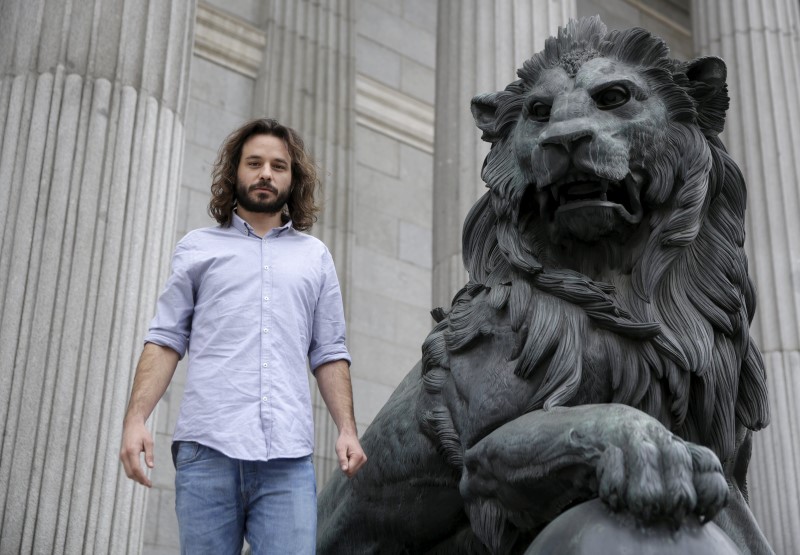By Angus Berwick
MADRID (Reuters) - Sitting around in hostels was not what Spain's new generation of politicians expected when they entered parliament on a wave of enthusiasm after a national election in December broke traditional parties' grip over politics.
But three months on, lawmakers from around the country lodged in the streets surrounding parliament are still in limbo as parties have been unable to cobble together a coalition to oversee Spain's uneven recovery from a deep recession.
Their arrival, driven by voters weary of austerity and an establishment rife with corruption scandals, ushered in a new era for Spanish politics by ending the duopoly over government held by the People's Party (PP) and the Socialists since the end of dictatorship in the late 1970s.
But the threat of new elections looms. If parties fail to find common ground by May, parliament would be absolved and new lawmakers' hopes of reforming Spain's tired political system would be dashed or at least put on hold.
"We could be the shortest lived delegates in history," said Angela Rodriguez of regional Galician party En Marea, in coalition with anti-austerity party Podemos on the national stage.
"It's a feeling of instability, of not knowing what could happen in the next few months," said the 26-year-old, who moves between hostel rooms and friends' flats, unwilling to pin down a proper lease.
But there are few signs that lawmakers like Rodriguez could soon start planning for the long term.
Parties' lines have long been drawn in the sand. All opposition parties have ruled out support for the PP under Rajoy, who lost his parliamentary majority in December and advocates a coalition of centre-left and centre-right parties.
Podemos and newcomer liberals Ciudadanos refuse to join a government that would include the other, complicating the Socialists' plans for a joint "government of change." Leaders have until May 3 to form a government or new elections will be called most likely in late July. Polls suggest another election would yield an equally fragmented results.
FRUSTRATION
In Madrid's Literary Quarter close to parliament, once the home of writers such as "Don Quijote" author Miguel de Cervantes, and where stores now peddle souvenirs to tourists, hostel owners say there is a constant flow of politicians through their rooms.
"I imagine they're not from the PP," said Alejandro Merino, a receptionist at Hostal Alexis on the fourth floor of a building above a gym, of his guests. "They're respectful and quiet," he added.
After parliament closes each day, bars and restaurants fill with a mismatch of politicians from different parties.
"It's a bit like college," said Enric Bataller of Valencian regional party Compromis, another Podemos ally.
But delegates say the situation they have found themselves in has started to take its toll.
"Obviously there is frustration," said Maria Such, a new Socialist delegate for Valencia and the youngest member of parliament. "We have the responsibility to put forward policy but it is impossible since everything is blocked up."
In a meeting with union representatives a few days earlier, the 25-year-old said the party had to delay its electoral pledge to propose abolishing an article in Spain's criminal code that restricts workers' right to strike, which is opposed by the PP.
"We said to them that until we have a government we cannot set a period to throw the reform forward, it's a shame," Such, another hostel lodger, said.
Such's struggle to pass legislation highlights the broader problem faced by delegates.
Rajoy, whose government remains in power in an acting capacity, refuses to answer a parliament that he says does not support him. This week alone, 20 bills that were passed by parliament, including one aimed at tackling corruption, will not become law.
PEOPLE WILL LOSE FAITH
Lawmakers say the delay in forming a government risks alienating a newly energized electorate, especially Spain's young people who bore the brunt of the economic crisis as their unemployment levels topped 50 percent.
"The political forces are sending a bad message, it is almost as if we are telling people their vote has been futile," Miguel Vila, Podemos' new delegate for the northern region of Burgos, said in an interview.
Before taking the job, Vila, who is 32, worked as a television cameraman in the parliament recording the political class as it scrabbled to deal with the recession that bankrupted banks and sent government debt soaring.
He said his switch to the other side of the lens represents how frustrated ordinary Spaniards decided to take matters into their own hands.
"I saw how politicians of the two traditional parties worked with their backs turned to the people."
The constant moving between hostels was a bit of a pain, he admitted, but it was irrelevant compared to the risk that the gridlock in forming a government could stem the momentum behind new parties.

"As long as there is no government of real change that can revert the PP's economic policies and cuts, people will lose faith," Vila said.